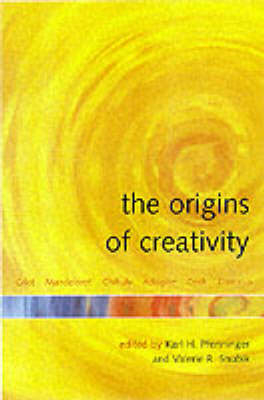
The Origins of Creativity
Oxford University Press (Verlag)
978-0-19-850715-4 (ISBN)
- Titel gebraucht verfügbar
- Artikel merken
After Newton died in 1727, a monument was erected in the Scientist's Corner of Westminster Abbey. It was decorated with a pile of four books and adorned with cherubs holding a prism, a telescope and newly minted coins. The implication is clear. Newton's towering intellect and god-given gift for creative thinking was the origin of his inspiration. Not far away, at the front of the monument to Newton, is the tomb of Charles Darwin, who published On the Origin of Species, which first discussed the evolution of man. The proximity of the monuments is telling. If we are to define the single, most unique human attribute evolution has produced, it must be our ability to think creatively. Thinking is the ultimate human resource. Breaking through the barriers posed by dogma, and reaching beyond the limits of established patterns of thinking to discover what is new and useful is the engine that drives society.
This book, which had its genesis in a conference organized by Karl Pfenninger, and held at Aspen, Colorado, entitled 'Higher brain function, art and science: an interdisciplinary examination of the creative process', brings together articles by thirteen contributors from the fields of science, art and music. Two of the contributors have been awarded Nobel prizes, and all are distinguished representatives of their fields. The Origins of Creativity is organized around four central themes of creativity: the creative experience in art and science; the biological basis of imagination, emotion and reason; creative powers and the environment; and the mind's perception of patterns. The views of artists, who couch their ideas in more metaphorical language, mingle with the analytical thoughts of scientists who strive to understand how the brain generates images and ideas. The voices of creators - artist, scientist, mathematician - and of those who study creative activity - neuroscientist, psychologist, philosopher - generate a broad spectrum of views on creativity whose integration offers new insights and becomes a creative act in itself.
This book offers insights into the origins of human creativity to scientists, artists, and general readers. Its inter-disciplinary authorship presents a uniquely broad perspective on current research, and the style throughout is accessible and engaging.
The Entangled Bank: An Introduction (Karl Pfenninger) 1. Eureka! Discovery versus Creation. Overturning the Dogma: Catalytic RNA (Thomas R Cech). Form from Fire (Dale Chihuly). The Great Continuum (Gunther Stent). 2. Body, Brain and Mind: Emotion and Reason. Embracing the Range (David E Rogers). Some Notes on Brain, Imagination and Creativity (Antonio Damasio). With Music in Mind (Bruce Adolphe). The Evolving Brain (Karl H Pfenninger). 3. The Adaptive Mind: Deprivation versus Rich Stimulation. The Early Experience (Janina R Galler). Creators: Multiple Intelligences (Howard E Gardner). Tides of Genius (George E Palade). 4. Patterns of Perception. A Painter's Perspective (Francoise Gilot). Line versus Color: the Brain and the Language of Visual Arts (Charles F Stevens). The Fractal Universe (Benoit P Mandelbrot). Insights into the Foundations of Creativity: a Synthesis (Karl Pfenninger).
| Erscheint lt. Verlag | 1.7.2001 |
|---|---|
| Co-Autor | Valerie Shubik |
| Zusatzinfo | colour and b&w illustrations |
| Verlagsort | Oxford |
| Sprache | englisch |
| Themenwelt | Sachbuch/Ratgeber ► Natur / Technik |
| Medizin / Pharmazie ► Medizinische Fachgebiete ► Neurologie | |
| Naturwissenschaften ► Biologie ► Evolution | |
| Naturwissenschaften ► Biologie ► Humanbiologie | |
| Naturwissenschaften ► Biologie ► Zoologie | |
| ISBN-10 | 0-19-850715-1 / 0198507151 |
| ISBN-13 | 978-0-19-850715-4 / 9780198507154 |
| Zustand | Neuware |
| Haben Sie eine Frage zum Produkt? |
aus dem Bereich



